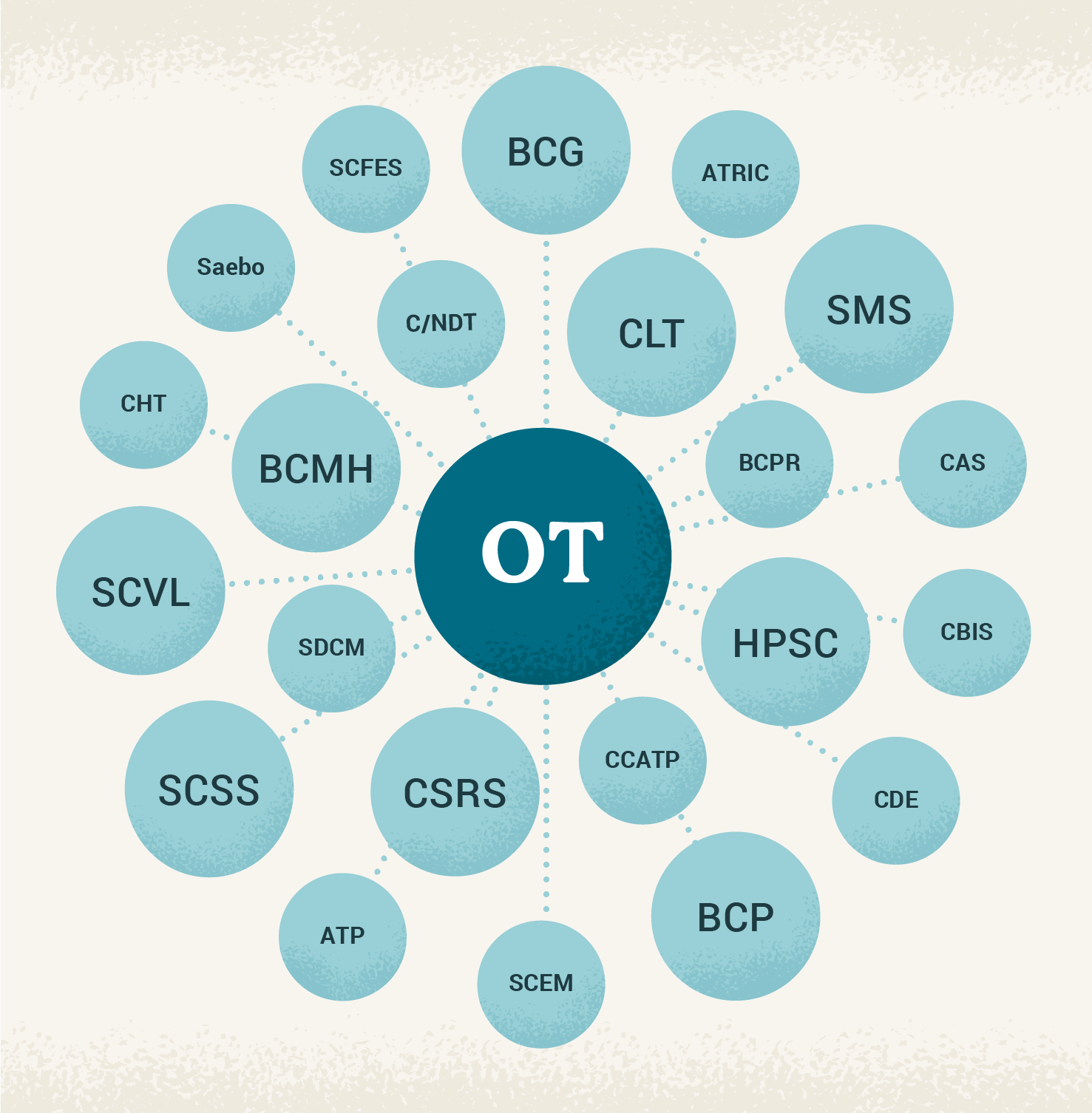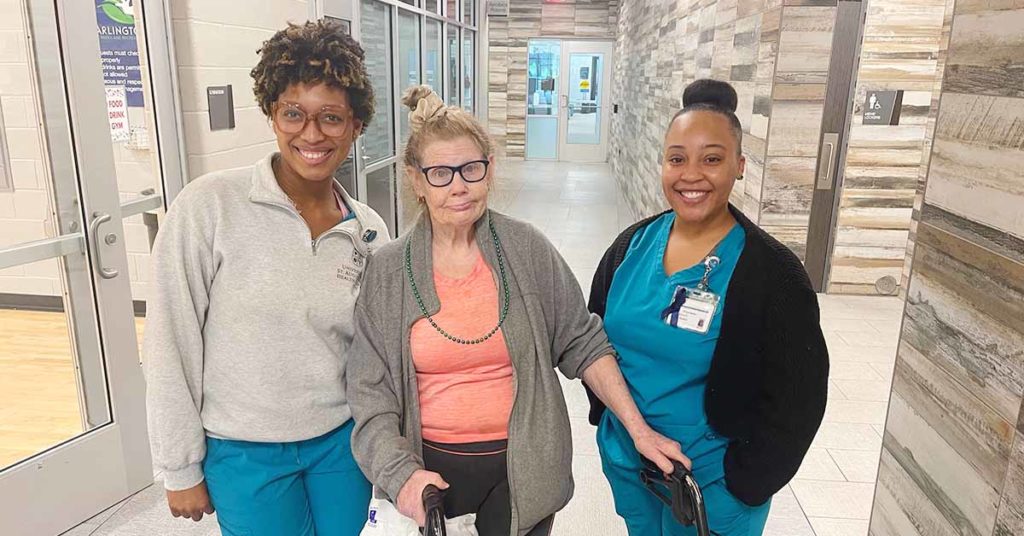

As an occupational therapist (OT), you will have the opportunity to specialize in one or more areas over the course of your career. Adding a specialty demonstrates your knowledge of an area you’re passionate about, enhances your credentials and opens doors to grant funding and new job possibilities.
Occupational Therapy Specialty Education
Typically, OTs add a specialty after they have earned their masters of occupational therapy degree and are already working in that specialized area of OT. Adding a specialty involves earning a certificate through the American Occupational Therapy Association (AOTA) or another certificate-granting organization.
In some cases, you must take classes or an exam; in others, proving your prior experience is all that is needed. Rather than being a prerequisite to working in that specialty, a certificate usually serves as proof of prior experience.
In this guide, we cover more than 20 of the most popular occupational therapy specialties and the requirements you need to get started.
Types of Occupational Therapy Specialties


1. Aquatic Therapeutic Exercise
Occupational therapists who work with clients in the water to help them increase mobility, coordination, and muscle tone may earn an Aquatic Therapeutic Exercise Certification (ATRIC). This certification proves their training in aquatic therapy principles and methods, movement mechanics, and safety and risk awareness strategies. OTs with this specialization help patients improve joint movement and reduce pain through doing exercises in warm or cool water.
Candidates can become certified through the Aquatic Therapy and Rehab Institute (ATRI). They must:
- Have 15 hours of education focused on aquatic therapy, aquatic rehab, and/or aquatic therapeutic exercise (preferably hands-on education)
- Pass the ATRIC exam
2. Assistive Technology
The Assistive Technology Professional (ATP) certification documents the OT’s competence in working with wheelchairs, seating products, and other assistive machinery to help patients with disabilities.
Candidates become certified through RESNA. You must:
- Gain work experience between 1,000 and 6,000 hours, depending on the level of your previous education
- Complete 10, 20, or 30 training hours, also depending on previous education; earned concurrently with your work experience
3. Autism
If you work with people on the autism spectrum, consider earning your Certified Autism Specialist (CAS) certificate to boost your knowledge and credentials and demonstrate your commitment to ongoing training in this area.
Candidates can become certified through the International Board of Credentialing and Continuing Education Standards (IBCCES). You must:
- Hold at least a master’s degree in OT (this can be waived if you have a bachelor’s degree and 10 years of experience)
- Have two years of experience working in a field that focuses on individuals with autism
- Complete 14 hours of continuing education that directly relates to autism
- Pass IBCCES’s Autism Competency Exam
4. Brain Injuries
Healthcare professionals who work with clients with brain injuries may earn a Certified Brain Injury Specialist (CBIS) certificate. The certification exam covers brain behavior, different types of brain injury, how to interact with and educate patients/families, safe medication management practices, and more.
Candidates become certified through the Brain Injury Association of America. They must:
- Have 500 hours of direct contact experience with an individual suffering from a brain injury, completed under formal supervision or professional licensure
- Have at least a high school diploma (or equivalent)
- Pass an exam administered by BIAA
Learn More About Our OT Programs
5. Diabetes
A Certified Diabetes Educator (CDE) is a health professional who demonstrates advanced knowledge in diabetes management, prediabetes, and diabetes prevention. The CDE educates those affected by diabetes to help them understand and manage their disease.
Candidates can become certified through the Certification Board for Diabetes Care and Education (CBDCE). They must:
- Have a master’s degree or be a licensed OT with a minimum of two years of practice experience
- Have a minimum of 1,000 hours providing diabetes care and education within five years before the application, with 200 of those hours accrued in the most recent year before applying
- Minimum of 15 hours of continuing education from a recognized CBDCE provider
6. Driving and Community Mobility
Occupational therapists who earn a Specialty Certification in Driving and Community Mobility (SCDCM or CDCM-A) “are skilled at evaluating a person’s ability and potential to drive, providing education and adaptations to support driving, and providing comprehensive resources and training when driving is no longer safe and other forms of community mobility need to be explored,” according to the AOTA.
Some responsibilities of OTs with this specialty include assessing driving readiness in adolescents, helping clients increase their comfort levels with new methods of transportation, and modifying vehicles with adaptive equipment.
Current specialists in this area are recognized by the AOTA, but new candidates will need to wait while the AOTA shifts from a portfolio assessment to an exam-based certification process. Check its website for updates.
7. Environmental Modification
According to the AOTA, OTs who earn their Specialty Certification in Environmental Modification (SCEM or SCEM-A) determine environmental needs and provide occupational therapy intervention strategies, assistive devices, space adaptations, and/or assistive technologies “that reflect the person-environment fit and address occupational performance that maximizes participation, safety, accessibility, and independence.” Environmental modification specialists typically work as consultants.
Current specialists in this area are recognized by the AOTA, but new candidates will need to wait while the AOTA shifts from a portfolio assessment to an exam-based certification process. Check its website for updates.
8. Feeding, Eating and Swallowing (SCFES or SCFES-A)
This certification is for OTs who work with patients who have sensory processing deficits associated with diagnoses such as:
- Sensory processing disorder
- Autism spectrum disorder
- Motor deficits
This also includes those with neurological diagnoses such as cerebral palsy or stroke, who may have trouble with feeding, eating, and swallowing. If you work in this field, consider enhancing your credentials by earning your Specialty Certification in Feeding, Eating, and Swallowing (SCFES or SCFES-A).
Current specialists in this area are recognized by the AOTA, but new candidates will need to wait while the AOTA shifts from a portfolio assessment to an exam-based certification process. Check its website for updates.
9. Gerontology
Occupational therapists who earn their Board Certification in Gerontology (BCG) through the AOTA engage with older adults in their homes and in clinical settings to work on issues related to:
- Cognitive changes
- Mobility issues related to daily tasks
- Post-stroke recovery
- Fall prevention
- Driving skills
Current specialists in this area are recognized by the AOTA, but new candidates will need to wait while the AOTA shifts from a portfolio assessment to an exam-based certification process. The Gerontology exam is slated to debut in mid-2023; check its website for updates.
10. Hand Therapy
A Certified Hand Therapist (CHT) works with patients who have conditions affecting the hands and upper extremities caused by trauma or disease.
Candidates become certified through the Hand Therapy Certification Commission (HTCC). Eligibility requirements include:
- A professional degree in OT, plus an active license, certification, or registration
- Working as a licensed OT for a minimum of three years
- Minimum of 4,000 hours of direct practice experience in hand therapy
11. Hippotherapy
According to the Hippotherapy Certification Board, “hippotherapy” refers to how rehabilitation professionals “use evidence-based practice and clinical reasoning in the purposeful manipulation of equine movement to engage sensory, neuromotor, and cognitive systems to achieve functional outcomes.” If you’re an OT with experience in this field, consider becoming certified as a Hippotherapy Clinical Specialist (HPSC).
Eligibility requirements include:
- OT licensure
- Skilled riding ability and experience working with horses
- Three years of full-time practice experience (6,000 hours)
- A minimum of 100 hours of one-on-one hippotherapy in clinical practice
- Successful completion of the Hippotherapy Clinical Specialist Certification Examination
12. Low Vision
Low vision is a practice area for occupational therapists that focus on visual impairment in children, vision processing deficits related to traumatic brain injury, and eye diseases related to aging (cataracts, glaucoma, macular degeneration, and diabetic retinopathy).
Occupational therapists who earn their Specialty Certification in Low Vision (SCLV or SCLV-A) use optical devices and assistive technology to help their clients enhance their vision and manage diseases.
Current specialists in this area are recognized by the AOTA, but new candidates will need to wait while the AOTA shifts from a portfolio assessment to an exam-based certification process. Check its website for updates.
13. Lymphedema
A Certified Lymphedema Therapist (CLT) focuses on treating lymphedema patients safely and effectively using complete decongestive therapy (CDT). During training, therapists will learn manual lymph drainage (MLD), compression bandaging, patient-specific exercises, and skin care.
Candidates can become certified through lymphatic therapy schools such as the Norton School of Lymphatic Therapy and The Brennan School of Innovative Lymphatic Studies. Eligibility requirements include:
- Must be a licensed occupational therapist (or other listed healthcare professional)
- Minimum of 135 hours of coursework in complete decongestive therapy (CDT)
14. Mental Health
OTs who work in the field of mental health—cognitive assessment, sensory strategies, group process, therapeutic alliances, and socio-emotional skills—can earn their Board Certification in Mental Health (BCMH) through the AOTA.
Current specialists in this area are recognized by the AOTA, but new candidates will need to wait while the AOTA shifts from a portfolio assessment to an exam-based certification process. Check its website for updates.
15. Neuro-Developmental Treatment
Neuro-Developmental Treatment (NDT), also known as “the Bobath method,” is an interdisciplinary clinical practice model that uses movement analysis for habilitation and rehabilitation of individuals with neurological pathophysiology. Occupational therapists who earn their Neuro-Developmental Treatment Certification (C/NDT) treat patients who have suffered from strokes, brain injuries, cerebral palsy, and other neuromotor disorders.
Candidates can become certified through the Neuro-Developmental Treatment Association (NDTA). They must:
- Hold an NDTA membership
- Complete one of the following NDTA-sponsored certificate courses:
- NDT/Bobath Certificate Course in the Management of Adults with Stroke and Brain Injury
- NDT/Bobath Certificate Course in the Management & Treatment of Children with Cerebral Palsy and Other Neuromotor Disorders
16. Pediatrics
Occupational therapists who earn their Board Certification in Pediatrics (BCP) help children of all ages with routine activities such as learning, playing, and socializing. They work with children who need help with general functioning, such as walking and feeding, as well as kids with physical and mental disabilities.
This certification is currently available through the AOTA, via an exam-based certification process. Check its website for details.
17. Physical Rehabilitation
Board Certification in Physical Rehabilitation (BCPR) is a formal certification available through the AOTA that OTs can obtain after working in a variety of OT specialties. According to the AOTA, this specialization includes the ability to “design and implement physical rehabilitation interventions that are client-centered, contextually relevant, and evidence-based to facilitate optimal occupational engagement.”
This certification is currently available through the AOTA, via an exam-based certification process slated to debut in late 2022 or early 2023. Check its website for updates.
18. Saebo
Saebo is a business that creates upper limb rehabilitation equipment. Those who become Saebo Certified Therapists are knowledgeable in this equipment and how it’s used to help patients suffering from neurological disorders, such as a stroke.
Candidates can become certified through Saebo. They must:
- Be a licensed occupational therapist
- Have experience with splints/orthotics and the treatment of neurological patients
19. School Systems
Occupational therapists who work in school settings can earn their School Systems (SCSS or SCSS-A) certification through the AOTA.
Current specialists in this area are recognized by the AOTA, but new candidates will need to wait while the AOTA shifts from a portfolio assessment to an exam-based certification process. Check its website for updates.
20. Seating and Mobility Specialist
The Seating and Mobility Specialty (SMS) certification is focused on seating, positioning, mobility, and assistive technology. This certification demonstrates the OT’s expertise in rehab technology, such as wheelchairs, seating interventions, and power mobility devices.
Candidates can become certified through the Rehabilitation Engineering and Assistive Technology Society of North America (RESNA). Eligibility requirements for this specialty include:
- Must have Assistive Technology Professional (ATP) certification from RESNA
- Minimum of 1,000 hours in any capacity of seating and mobility-related service
- Two of the following professional occupational therapy activities completed in the last five years: mentoring/supervision, leadership, publication, presentations/formal instruction, advocacy, continuing education, or client service delivery
21. Stroke Rehabilitation
The Certified Stroke Rehabilitation Specialist (CSRS) indicates advanced training in stroke rehabilitation. The field strives to find the best methods of treatment plan and care for stroke survivors.
Candidates can become certified through the American Stroke Association (ASA). They must:
- Be a licensed occupational therapist or occupational therapy assistant
- Complete four 8-hour seminars in the education program offered by the ASA
- Pass the CSRS exam
22. Clinical Anxiety Treatment
The Certified Clinical Anxiety Treatment Professional Certification (CCATP) is a newer specialization that takes about three to four weeks to complete. According to the Institute of Certified Anxiety Treatment Professionals (ICATP), the CCATP “is designed to provide certification opportunities to mental health professionals who are licensed to work with anxiety-diagnosed children and adolescents at a clinical level.”
Candidates can become certified through the Institute of Certified Anxiety Treatment Professionals (ICATP). To obtain certification, they must:
- Complete one of the approved training courses listed here
- Pay a certification fee
- Submit CEU certificates
This post is the first in a series about interesting occupational therapy career paths. Stay tuned for the next installment, about innovative non-clinical and entrepreneurial roles.
The largest OT graduate school in the United States, the University of St. Augustine for Health Sciences (USAHS) offers hands-on Master of Occupational Therapy (MOT) and Doctor of Occupational Therapy (OTD) degrees. Practice with mock patients in our state-of-the-art simulation centers and learn anatomy with our high-tech tools. Prepare for clinical practice with patients across the lifespan, as well as advanced roles in research, practice leadership, and policymaking. Residential and Flex (weekend-focused) tracks available. We also offer an online Post-Professional Doctor of Occupational Therapy (PPOTD) program, which is designed for working clinicians and healthcare educators who need flexibility in earning their degree.
Sources:
AOTA, “AOTA’s Advanced Certification Program”: https://www.aota.org/Education-Careers/Advance-Career/Board-Specialty-Certifications-Exam.aspx
Meredith Chandler, “20 Occupational Therapy Specialties to Advance Your Career,” My OT Spot: https://www.myotspot.com/occupational-therapy-specialties/
Sarah Lyon, “30+ OT Certifications and Specialties,” OT Potential, September 18, 2019: https://otpotential.com/blog/where-to-go-ot-degree#caps=
“Certified Aging-in-Place Specialist (CAPS).” NAHB, www.nahb.org/Education and Events/Education/Designations/Certified Aging-in-Place Specialist CAPS.
“Aquatic Therapy & Rehab Institute, Inc.” Aquatic Therapy & Rehab Institute, Inc., www.atri.org/.
“Autism Certification and Training for Professionals.” Certified Autism Specialist, www.certifiedautismspecialist.com/.
Brain Injury Association of America. (n.d.). CBIS Information & Eligibility. Retrieved from https://www.biausa.org/professionals/academy-of-certified-brain-injury-specialists/certified-brain-injury-specialist/cbis-information-eligibility
NCBDE, www.ncbde.org/.
Hand Therapy Certification Commission – Eligibility Requirements, www.htcc.org/certify/test-information/eligibility-requirements.
“American Hippotherapy Certification Board.” Hippotherapy Certification Board, hippotherapycertification.org/.
“Complete Decongestive Therapy – CDT Therapy: Lymphedema Courses: Norton School.” Complete Decongestive Therapy – CDT Therapy | Lymphedema Courses | Norton School, www.nortonschool.com/cdtcourse.html.
“The Brennan School of Innovative Lymphatic Studies.” The Brennan School of Innovative Lymphatic Studies, lymphedematraining.com/.
“SLP & NDT.” Neuro-Developmental Treatment Association, www.ndta.org/.
“Saebo Certification .” Saebo, www.saebo.com/courses/saebo-certification-live/.
“SMS General Info.” SMS General Info | Rehabilitation Engineering & Assistive Technology Society of North America, www.resna.org/get-certified/sms-general-info.
“Certified Stroke Rehabilitation Specialist.” Www.stroke.org, www.stroke.org/en/professionals/professional-membership-and-continuing-education/certified-stroke-rehabilitation-specialist.








